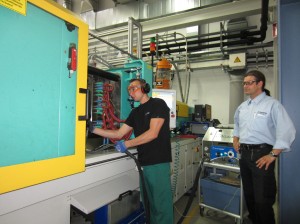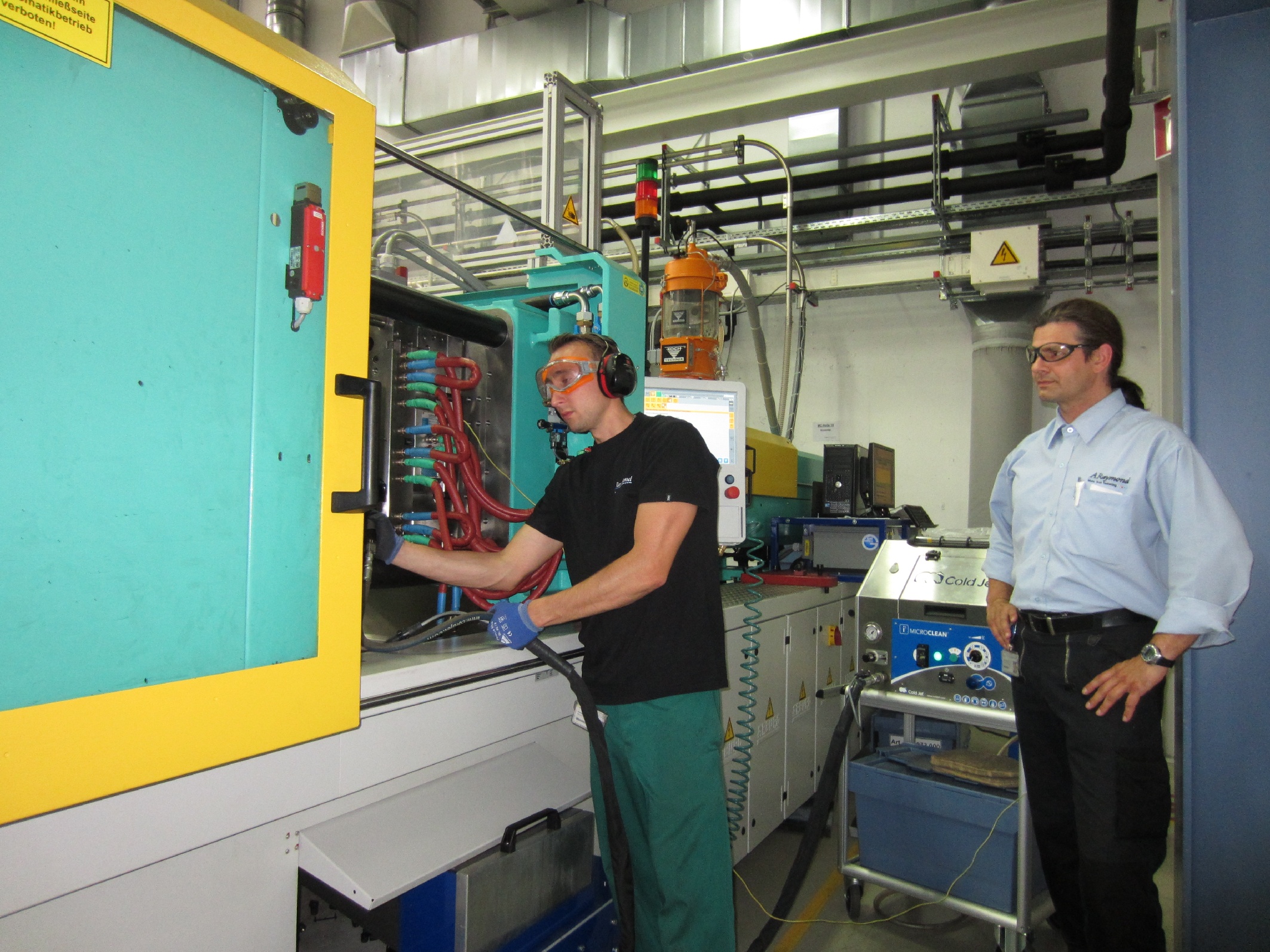The cleaning process for injection molds offers great potential to improve machine utilization and efficiency. An international supplier of automotive parts increased its machine utilization by using dry ice cleaning and has achieved significant higher process reliability.

When it comes to fasteners, the A. Raymond Group is one of the leading development and production partners of the automotive industry. In addition to the automotive branch, the company – founded in 1865 in Grenoble (Switzerland) – supplies innovative fastening and connecting systems for the solar, household, aerospace, electronics, and construction industries.
Production takes place at 20 locations around the globe including the German subsidiary A. Raymond GmbH & Co. KG, founded in 1898 in Lorrach. This is where, among others, special fasteners and couplings for the body, interior, drivetrain, air and fluid management as well as vehicle electronic systems are manufactured in injection molding processes. These include plug systems, screw parts and windscreen washer nozzles. These parts are made of polycarbonate, polyamide and POM, and they are manufactured as endurance runners in three shifts (24/7).
Cleaning constrains productivity
“The plastic materials contain flame retardants and additives that leave a coating in the cavities of the tools. This coating needs to be removed every two – three days to ensure that the quality of the parts will not be affected. The connector systems also need to go through multiple validation tests,” said Stefan Preller, Director of Manufacturing Industrialization (DMI), responsible for the industrialization of tools in the plastic industry.
To clean the tools, they first needed to be removed from the machine and disassembled so the small cavities could be cleaned with special tools, brushes and solvents. The spool was cleaned in an ultrasonic bath. The time required to disassemble, clean and reassemble the tools took sometimes several hours. “The regular cleaning process led to a significant reduction in machine utilization,” said Preller. “Furthermore, the cleaning degree of the tools directly influenced the quality of the parts. The tools were also damaged occasionally.”
The solution – dry ice cleaning with block shaving technology
In order to optimize this process, Preller – who already had experience with dry ice cleaning – contacted several dry ice cleaning manufacturers for a solution. The standard method of using dry ice pellets to clean was unsuitable because the ice in grain format achieved an insufficient clean in the small cavities and contours. Also, there was too much noise produced.
Cold Jet’s innovative i3 MicroClean® System, which is significantly quieter, was the appropriate solution for the project. With this environmentally friendly method, carbon dioxide comes in the form of blocks – where ice is scrapped off with the patented block-shaving technology. The shavings provide for a finer cleaning media and, when introduced to compressed air through a high performance nozzle, provides an effective, yet non-abrasive, clean.
“The i3 MicroClean System allows for an intense and deep cleaning of the contours without disassembly – even for the extremely fine erosion structures of the tools,” said Preller. To clean, the mobile and compact Cold Jet system is driven to the relevant injection mold, connected to a compressed air supply and also to a static ground cable and the molds are cleaned with the appropriate nozzle. Therefore, a maximum of only 45 minutes is required. “Due to the time savings, we were able to increase machine utilization significantly and the machine paid for itself in less than one year,” says Preller. “In addition, our workforce for the cleaning jobs has been reduced.”
The machine is also simple to operate. “I taught the staff how to operate the i3 MicroClean in less than 20 minutes,” said Preller. “Previously, a specially trained staff was required for tool cleaning and now it can be done easily by anyone. This is a significant advantage on the weekend, especially during the continuous shift system.”
Increased process reliability and labor protection
Cold Jet’s i3 MicroClean has also impacted process reliability and that is why damaging tools is almost impossible. Effective cleaning ensures that the vent of the injection mold is always optimal; therefore, validation tests of connector systems no longer fail. “We have increased the process reliability for this product group by 25 % using dry ice cleaning,” said Preller. “At the same time, the safety of the workers has been increased and the process is environmentally friendly, because the use of solvents has been reduced.
At A. Raymond in Lorrach, three i3 MicroClean systems are currently in use. Two of them are used for tool cleaning every two days. The third system is used in the Technical Plastic Maintenance department to clean injection molds. “Because of the savings in both time and costs, I am sure these systems will be used at other plants,” said Preller. “They allow for a significant increase in process reliability and have helped us to maintain our high quality standards.”
www.coldjet.com







